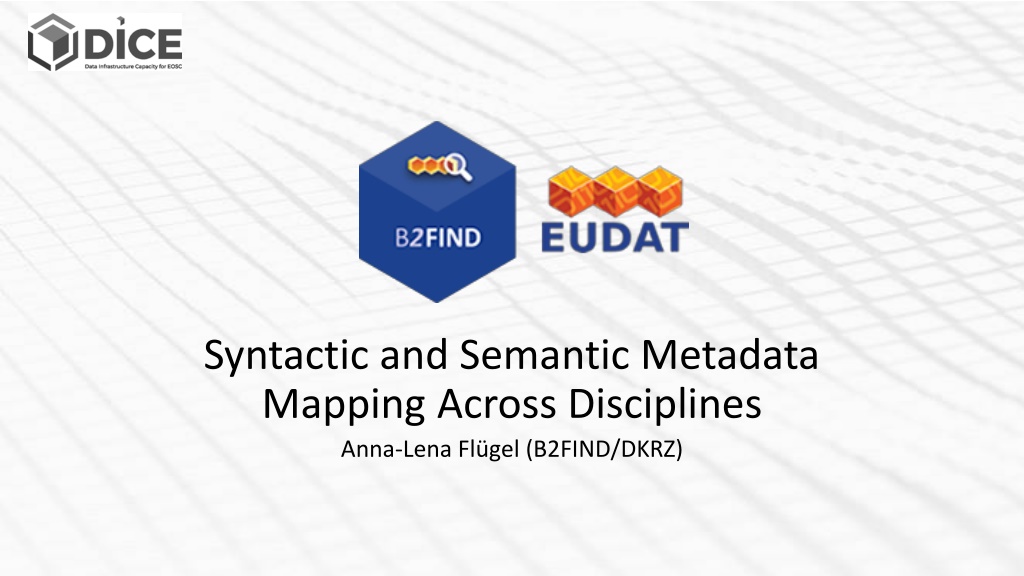
Mapping Metadata Across Disciplines
"Explore how B2FIND enables syntactic and semantic metadata mapping across diverse research areas, facing challenges and achieving successes through community collaboration and innovative approaches. Learn about the mapping of domain-specific metadata and the user-friendly discovery portal for research data."
Download Presentation

Please find below an Image/Link to download the presentation.
The content on the website is provided AS IS for your information and personal use only. It may not be sold, licensed, or shared on other websites without obtaining consent from the author. Download presentation by click this link. If you encounter any issues during the download, it is possible that the publisher has removed the file from their server.
E N D
Presentation Transcript
Syntactic and Semantic Metadata Mapping Across Disciplines Anna-Lena Fl gel (B2FIND/DKRZ)
What is it? B2FIND b2find.eudat.eu simple and user-friendly discovery portal for research data joint metadata catalogue for records from very divergent research areas and research infrastructures generic metadata schema based on DataCite April 20th 2021 CC BY 4.0 2
B2FIND how it works Search free text search faceted search (e.g. spatial/temporal coverage) to narrow down results Harvesting OAI PMH JSON API CSW Mapping syntactic: format conversion (mostly xml to json) semantic: templates for standard metadata schemas (reader) automatically map to b2f schema (including vocabularies, validation) specific: community requirements CC BY 4.0 April 20th 2021 3
Challenges Diverse vocabularies (or free text) used for keywords and research disciplines, sometimes even within one research community Multilingual search Granularity of the metadata Metadata schema: balance between generic and domain-specific April 20th 2021 CC BY 4.0 4
Mapping domain-specific metadata coverage in IVOA: MOC! Sky coordinates! <coverage> V <spatial>0/0-11</spatial> <temporal>57174 57174</temporal> <spectral>1.986e-19 4.966e-19</spectral> <waveband>Optical</waveband> </coverage> no useful mapping possible to generic metadata standards as <geolocation>, no match of spectral April 20th 2021 CC BY 4.0 5
Successes Thanks to close communication with enthusiastic (meta)data managers within the communities bottom-up approach! IVOA o mapping of free keywords to Unified Astro Thesaurus top-level concepts on IVOA side, implementation of these top-level concepts in B2FIND discipline classification EOSCNordic o plan: implementation of multilingual search options in Solr, same keyword referencing between Danish and Norwegian Archaeological Repositories Strong point of B2FIND: MetadataAccess to original metadata with every record April 20th 2021 CC BY 4.0 6
Example: Astrothesaurus in B2FIND Classification for Disciplines https://astrothesaurus.org/thesaurus/hierarchical-browse/ https://github.com/EUDAT-B2FIND/md-ingestion/blob/master/etc/b2find_disciplines.json April 20th 2021 CC BY 4.0 7
Principal Question "How can we enable reuse of research data across disciplines? Finding, accessing and interpreting data from another research domain can be a challenge in itself We need use cases for successful interdisciplinary data re-use from researchers, establish ongoing dialogue, get feedback how? see also: https://github.com/msdemlei/cross-discipline-discovery for "user stories as they might happen in an ideal future where cross-discipline data discovery and usage are more or less a reality by Markus Demleitner/GAVO April 20th 2021 CC BY 4.0 8
Questions Comments Remarks? Contact EUDAT Support Request Links https://eudat.eu/contact-support-request Contact B2FIND via email B2FIND Portal http://b2find.eudat.eu/ B2FIND Guidelines for Data Provider http://b2find.eudat.eu/guidelines/providing.html B2FIND in GitHub https://github.com/EUDAT-B2FIND/md-ingestion B2FIND Metadata Schema http://b2find.eudat.eu/guidelines/mapping.html martens@dkrz.de fluegel@dkrz.de April 20th 2021 CC BY 4.0 9
